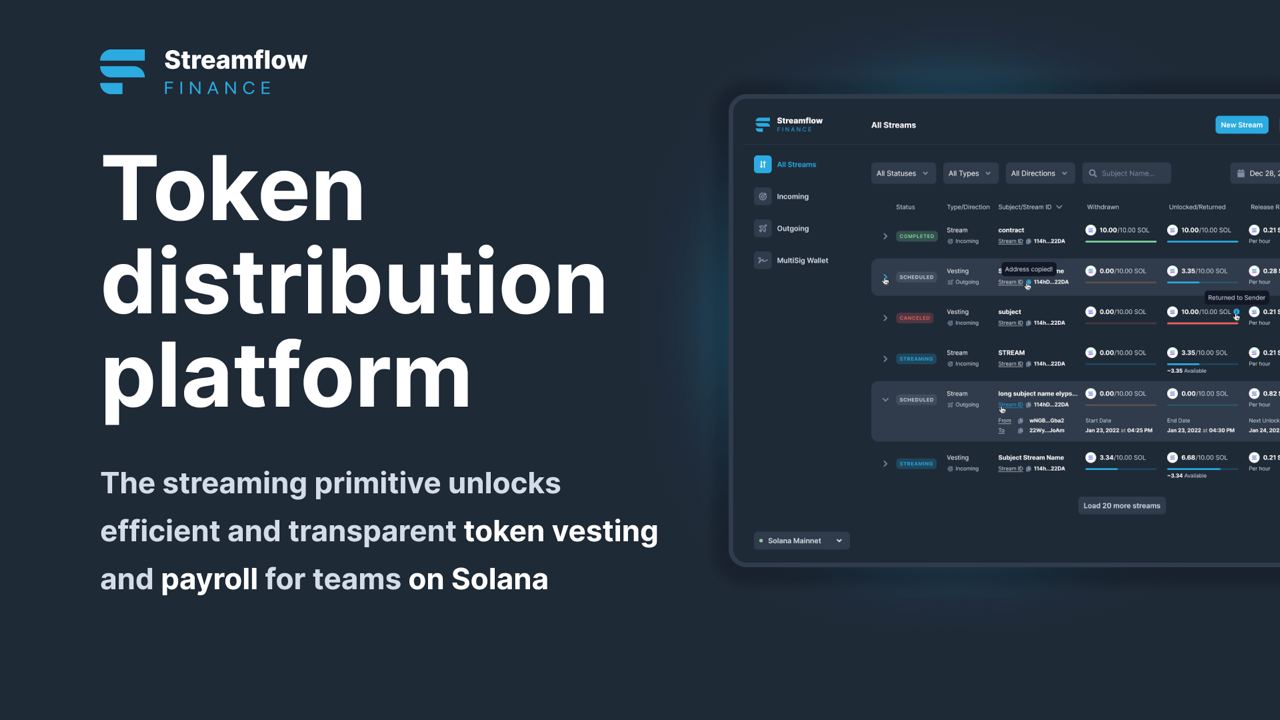
Streamflow is a platform with several products that businesses (and individuals) can use to disburse funds. It recently raised $3.1 million in a seed round led by Jump Crypto. The round included Solana Ventures, T3E, AngelDAO, Ratio Finance, Huobi Ventures, Hypersphere, MEXc Labs, IVC, Solidity Ventures, and Genblock Capital.
Streamflow features several products, including token vesting, payroll, and batch payments via permissionless multi-sig wallet. It is building a protocol, with SDKs and applications to perform token vesting, manage payroll for organizations, have multi-signature treasuries, etc. They will help organizations save time and money expenses.
Streamflow Overview
Streamflow was created to solve some payment problems on Solana. These problems include the absence of multi-sig solutions, illiquid vesting contracts, lack of a crypto-native token distribution product, and an event-based token unlocking product. Also, the existing solutions, which were on the Ethereum network, are slow and costly.
It decided to develop a payment streaming solution that is an efficient, simple, and secure token distribution platform. The streamflow app has configurable features that allow employees, freelancers, service providers, and contractors to process payments as per their requirements. It boasts unique features that are beneficial to both the employer and employee. It uses a decentralized wallet, funds, and employees’ addresses to run payroll streams. It is bankless and paperless, thereby reducing time and money spent.
Token vesting that takes up the time of crypto teams has been optimized by Streamflow. With its token vesting app, token vesting can be handled in a simple, permissionless, and decentralized way with its programmable features, saving time. The app provides an optimized way to vest SPL tokens to crypto teams, investors, and communities.
Streamflow aims to simplify financial workflows in the crypto space. It employs decentralized, permissionless, and trust-minimized tools to improve financial workflows and payment-related tasks. It offers its batch payment and multi-sig vault solutions on Solana.
These solutions are available to DAOs, venture capitalists, foundations, crypto teams, and individuals for several financial services. These services include vesting contracts, paying salaries, sharing airdrops, disbursing rewards, and processing subscriptions and grants.
Streamflow Features
Streamflow is an inclusive platform that can be used by everyone. It has a frictionless and easy-to-use interface to aid adoption. It performs transactions instantly at a cheap rate and a fraction of a second. It plans on creating integrations with DeFi and crypto protocols to aid capital efficiency.
Streamflow currently has two products, token vesting, and payroll streams, on mainnet. It has plans to launch multi-signature vaults and batch payments in future. It is working to innovate and grow its products and services over time.
The difference between a token vesting stream and a payroll stream is that you can set up a cliff time and release a percentage for a vesting contract stream, but you can’t for a payroll stream. Similarly, you can top up a payroll stream, but you can’t do that in a vesting contract stream.
The core of Streamflow consists of a protocol for streaming payments, that acts like a time-lock escrow service for funds. It serves as a building block for many payment-related use cases, including risk-minimized trial period, token vesting, progressive payroll, continuous fundraising and donations, subscriptions, any pay-per-usage use case.
Streamflow charges a small service fee of 0.25% on any amount being streamed. Asides from this, the Solana network charges fees as well. It is advisable to have at least 0.02 SOL to avoid failed transactions. Streamflow plans on launching its native token, $STRM, which will serve various functions in the ecosystem. It can be used for the lockup mechanism. Streamflow through its products aims to make token distribution easier and faster.



